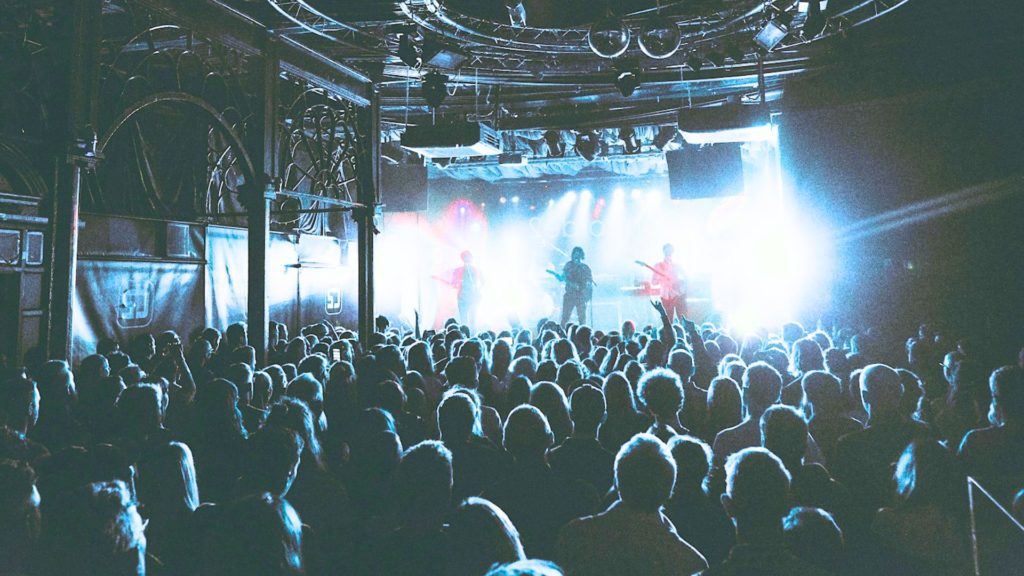

Famous University Gigs That Changed Music
Table of Contents
University campuses and student unions have long been cultural and political hubs in the UK, especially during the height of the punk and rock movements.
These venues hosted some of the most legendary performances, reflecting the vibrant and rebellious spirit of the times. This article delves into iconic gigs that took place at university campuses and the broader cultural context in which they existed.

Legendary Performances at University Campuses
Joy Division at University of London (1980)
On February 8, 1980, Joy Division delivered a performance at the University of London that has since become legendary. This gig, part of their “European Tour”, was notable not just for its raw intensity but also for its place in the band’s trajectory as they approached the peak of their brief but influential career. The setlist included classics like “Disorder”, “Love Will Tear Us Apart”, and “Transmission”. The audience was captivated by Ian Curtis’s haunting presence and the band’s powerful sound. This performance epitomized the post-punk era’s dark, introspective atmosphere and left an indelible mark on those who attended .
The Clash at Leeds University (1977)
The Clash’s performance at Leeds University in 1977 was a defining moment for both the band and the punk movement. Known for their politically charged lyrics and explosive stage presence, The Clash delivered a high-energy set that resonated deeply with the student audience. Tracks like “London’s Burning” and “White Riot” encapsulated the rebellious spirit of the era. This gig highlighted how university campuses served as breeding grounds for the punk ethos, combining music with a fervent desire for social change.
The Sex Pistols at Manchester Polytechnic (1976)
In 1976, the Sex Pistols performed at Manchester Polytechnic, a gig that was as chaotic as it was influential. The performance was marked by the band’s confrontational style and the audience’s fervent response. This gig is often cited as a pivotal moment in the rise of punk rock in the UK, showcasing the Sex Pistols’ raw power and the movement’s defiance of the status quo. It was gigs like this that solidified university campuses as key venues for the burgeoning punk scene.
The Smiths at University of London Union (1983)
On May 6, 1983, The Smiths performed their sixth-ever gig at the University of London Union, an event that has become legendary among fans. This gig featured the live debuts of “You’ve Got Everything Now” and “Reel Around The Fountain”, with Morrissey’s charismatic presence and witty banter adding to the allure. The band’s setlist included:
- You’ve Got Everything Now (Live Debut)
- Accept Yourself
- What Difference Does It Make?
- Reel Around The Fountain (Live Debut)
- Wonderful Woman
- I Don’t Owe You Anything
- Hand In Glove
- Handsome Devil
- Miserable Lie
The performance is said to have earned The Smiths their first appearance on the John Peel BBC radio show, a significant milestone in their early career. Music journalist Dave McCullough described the gig as “monstrously good” and highlighted Morrissey’s eccentric stage antics, such as hitting students with dead daffodils. This gig was crucial in establishing The Smiths as a formidable force in the music scene .
Student Unions: Political Hotbeds and Cultural Epicenters
Political Activism and Music
Student unions during the punk and rock eras were not just venues for music but also centers of political activism. These spaces were alive with debates, protests, and a fervent desire for social change. Bands often used their performances to address contemporary issues, merging music with politics in a way that resonated deeply with the student body.
DIY Ethos and the Punk Movement
The do-it-yourself (DIY) culture that defined punk music was embraced wholeheartedly by university campuses. Student unions provided a platform for emerging bands to perform without major label backing, fostering a sense of community and creativity. This ethos was instrumental in the growth of the punk movement, allowing new talent to flourish in an environment that valued authenticity over commercial success.
The Evolution of Student Culture and Music
Changing Times and the Decline of Student Unions as Music Venues
Over the years, the role of student unions as music venues has evolved. Factors such as commercialization, changes in student interests, and the rise of alternative venues have contributed to this shift.
However, the legacy of these iconic gigs remains, highlighting a unique cultural moment when music and student activism were deeply intertwined.
It should be noted small venues are struggling across the board. Something which was heightened throughout austerity and during the pandemic.
The Legacy of Campus Gigs
The impact of these legendary performances extends beyond the music itself. They shaped the careers of some of the most influential bands in history and left a lasting impression on those who experienced them. These gigs are remembered not just for the music but for the sense of community and political engagement they fostered.
Final thoughts on University Gigs
University gigs in the UK during the punk and rock eras were more than just concerts; they were a reflection of a vibrant and rebellious student culture.
These performances remain iconic. Symbolizing a time when music and activism were linked, and university campuses were at the heart of all of this. Cultural and political change often grew in these spaces.
The legacy of these gigs continues to inspire, but leave us wishing for a return to these more confrontational and accessible times.
Related Posts


